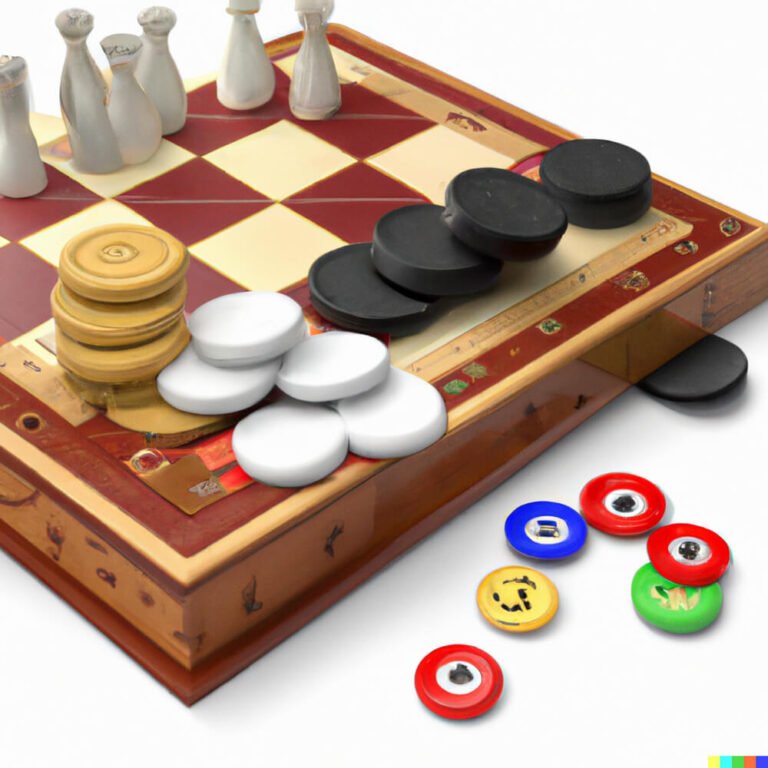Classic board and card games have stood the test of time, captivating players for generations with their timeless appeal. From the strategic challenges of Chess and the thrill of Poker to the family fun of Monopoly and Scrabble, these iconic games continue to hold a special place in our hearts. In this article, we will delve into the rich history, enduring popularity, cognitive benefits, and social connections of classic board and card games.
The history of classic board games is as diverse as it is fascinating, with origins dating back centuries. From ancient civilizations to modern-day reimaginings, games like Chess, Checkers, and Backgammon have evolved and adapted over time to capture the imagination of players worldwide. Similarly, card games such as Poker, Bridge, and Rummy have left a lasting legacy that continues to enchant enthusiasts young and old.
For many families, classic board games are an integral part of quality time spent together. Whether it’s assembling hotels in Monopoly or strategically placing tiles in Settlers of Catan, these cherished activities have become staple entertainment for cozy game nights at home. Additionally, these games offer more than just amusement – they also provide opportunities for learning valuable skills such as strategy, critical thinking, and interpersonal communication.
The History of Classic Board Games
Ancient Origins
Many of the classic board games we know today can trace their roots back to ancient civilizations. Chess, for example, is believed to have originated in India during the Gupta Empire and eventually spread to Persia, from where it made its way into Europe. Checkers, on the other hand, has a history that can be traced back over 5,000 years to ancient Mesopotamia and Egypt.
Backgammon has been played in various forms for over 5,000 years as well. Understanding these ancient origins adds a layer of historical significance to these beloved games.
Evolution Over Time
As these classic board games spread across different regions and cultures, they underwent changes and adaptations that shaped them into the versions we are familiar with today. For example, Chess underwent significant changes in Europe during the Middle Ages as new pieces and rules were introduced.
Similarly, variations of Checkers emerged in different parts of the world, each with its own set of rules. Backgammon also underwent modifications as it traveled through various empires and societies, leading to different variations of the game.
Cultural Impact
The enduring appeal of classic board games lies not only in their gameplay but also in their cultural impact. Games like Chess have been associated with intellectual prowess and strategic thinking, often becoming symbols of intelligence and sophistication within various societies.
The widespread popularity of Checkers and Backgammon similarly reflects their universal appeal across different cultures and social backgrounds. Over time, these games have become more than just pastimes – they have become ingrained in global culture as symbols of entertainment, skill, and tradition.
The Legacy of Card Games
Card games have a rich and fascinating history that stretches back centuries, captivating players from all walks of life with their blend of strategy, skill, and chance. Among the most enduring and beloved card games are Poker, Bridge, and Rummy, each offering its own unique set of challenges and thrills. These games have stood the test of time, retaining their popularity and drawing new generations of players into their timeless appeal.
The Enduring Allure of Poker
Poker has long been synonymous with the thrill of high-stakes gambling, but its enduring popularity extends far beyond the allure of winning big. With its combination of psychology, strategy, and probability, Poker has captured the imagination of players around the world. From casual home games to professional tournaments with massive cash prizes, the game continues to hold a special place in the hearts of card enthusiasts everywhere.
The Timeless Appeal of Bridge
Bridge remains one of the most popular and intellectually challenging card games in existence. Originating in the 19th century, this game demands teamwork and communication between partners as they strive to outmaneuver their opponents. As a result, Bridge has been embraced by people from all walks of life who appreciate its social aspects as well as its mental stimulation.
The Enduring Charms of Rummy
Rummy is renowned for its accessibility and wide appeal among players young and old alike. The game’s simple yet strategic mechanics make it easy for newcomers to grasp while offering depth for more experienced players to explore. Whether played casually among friends or as a competitive pursuit in organized competitions, Rummy continues to draw enthusiasts who appreciate its blend of luck and skill.
Family Favorites
Family game nights have been a longstanding tradition for many households, providing the perfect opportunity for quality time and friendly competition. Classic board games play a significant role in these gatherings, offering timeless entertainment that transcends generations. Here are some family favorite classic board games that have become staple activities for game nights:
- Monopoly: This iconic game of real estate and financial strategy has been a beloved staple in homes since its creation in With its mix of luck, negotiation, and planning, Monopoly continues to captivate players of all ages.
- Scrabble: A word game that challenges players to create words from lettered tiles and earn points based on letter values. Scrabble has been a go-to choice for families looking to test their vocabulary and critical thinking skills.
- Clue: A murder mystery game that requires deductive reasoning as players attempt to solve the identity of the culprit, the weapon used, and the location of the crime. Clue has maintained its appeal as a thrilling game of mystery and suspense.
These classic board games offer not only entertainment but also valuable learning opportunities for both children and adults. From teaching money management in Monopoly to expanding vocabulary in Scrabble, these games continue to be cherished by families around the world. The enduring popularity of these timeless classics demonstrates their ability to bring people together and create lasting memories during family game nights.
Strategy and Skill
Classic board and card games are not only a source of entertainment but also provide numerous cognitive benefits and strategic challenges. Many of these games require players to think critically, plan ahead, and adapt their strategies based on their opponents’ moves. Some of the most iconic classic games known for their strategic elements include Risk, Stratego, and Settlers of Catan.
One of the key reasons why classic board and card games like Risk, Stratego, and Settlers of Catan are beloved by players of all ages is the significant cognitive benefits they offer. These games often require strategic thinking, problem-solving skills, and the ability to anticipate future outcomes. As a result, playing these games can help improve cognitive functions such as memory, concentration, and decision-making abilities.
In addition to the cognitive benefits, classic games like Risk, Stratego, and Settlers of Catan also provide opportunities for players to hone their strategic skills. Players must carefully strategize their moves in order to outmaneuver their opponents and achieve victory.
These games often involve elements of risk management, negotiation with other players, and resource allocation – all crucial components of effective strategy building. Whether it’s expanding territories in Risk, hiding valuable pieces in Stratego, or building settlements in Settlers of Catan, these classic games offer a rich tapestry of strategic challenges for players to navigate.
Social Connection
Board and card games have long been recognized for their ability to bring people together and foster social interaction. Whether it’s a casual game night with friends or a family gathering, these classic games provide a platform for meaningful connections and shared experiences. The act of sitting down at a table and engaging in friendly competition creates opportunities for laughter, bonding, and genuine communication.
One of the key aspects of board and card games that contributes to social connection is the face-to-face interaction they require. In today’s digital age, where much of our communication takes place through screens, the opportunity to engage in real-time, in-person interactions is increasingly valuable.
Board and card games provide a space for people to put down their devices and truly engage with one another, whether it’s through lighthearted banter during a game of Uno or strategic planning in a round of Settlers of Catan.
Additionally, board and card games can serve as an icebreaker in social settings, helping to break down barriers and create a sense of camaraderie among participants. Whether it’s playing a cooperative game that requires teamwork or engaging in friendly competition, these activities can help foster connections between individuals who may not know each other well. As such, board and card games play an important role in building community and strengthening relationships among diverse groups of people.
Modern Revivals
The resurgence of tabletop gaming in recent years has brought classic board and card games to a whole new audience, reinvigorating the love for these timeless pastimes. With the rise of tabletop cafes, board game bars, and game nights at local community centers, people of all ages are rediscovering the joy of playing traditional games in a social setting.
This modern revival has also led to the reimagining and updating of vintage game reissues, bringing them into the digital age while still retaining their nostalgic charm.
One example of how classic games have been reimagined for contemporary audiences is the adaptation of popular board games into digital formats. Apps and online platforms now offer versions of games like Monopoly, Scrabble, and Risk that can be played virtually with friends or strangers from around the world. This modern twist on classic games has made them more accessible than ever before, allowing people to enjoy these beloved pastimes regardless of their geographical location.
Furthermore, the resurgence of tabletop gaming has given rise to a renewed interest in vintage game reissues. Classic board games that were once considered rare or out-of-print have been revived by publishers looking to capitalize on the growing market for nostalgic gaming experiences.
With updated artwork, improved components, and sometimes even new gameplay mechanics, these reissues appeal not only to fans of the original games but also to a new generation of players looking for unique and engaging gaming experiences.
| Classic Games | Modern Adaptations |
|---|---|
| Monopoly | Digital versions available as apps or online platforms |
| Risk | Virtual adaptations for multiplayer gameplay |
| Scrabble | Digital versions for playing with friends anywhere |
The Enduring Appeal
In conclusion, the enduring appeal of classic board and card games can be attributed to a combination of factors that have contributed to their continued popularity. These games have stood the test of time because they offer a timeless form of entertainment that transcends generations.
The simplicity and accessibility of classic games like Chess, Checkers, Poker, and Monopoly make them suitable for players of all ages, allowing families and friends to come together and enjoy these activities regardless of their experience level or background.
Furthermore, the cognitive benefits and strategic elements inherent in many classic board and card games also contribute to their enduring appeal. Games like Risk, Stratego, and Bridge require players to use critical thinking skills, forward planning, and decision-making abilities, which can be both intellectually stimulating and rewarding. This aspect has made classic games not only a form of entertainment but also a way to exercise the mind and improve cognitive function.
Finally, the social interaction fostered by classic board and card games plays a significant role in their continued popularity. Whether it’s through friendly competition or collaborative play, these games provide an opportunity for people to connect with each other in person, away from screens and devices.
The sense of community and camaraderie that arises from playing these games is invaluable in today’s digital age. As such, it is no surprise that classic board and card games continue to hold a special place in the hearts of many people around the world.
Frequently Asked Questions
What Is the Main Classic Board Game?
The main classic board game is typically considered to be Chess. This game has been played for centuries and is enjoyed by people of all ages around the world. Chess involves strategy, critical thinking, and careful planning, making it a timeless classic in the world of board games.
What Is the Most Popular Traditional Board Game?
The most popular traditional board game is often cited as Monopoly. With its iconic design and gameplay, Monopoly has captured the interest of players for generations. The game’s focus on buying, trading, and building properties has made it a staple in many households and a favorite among board game enthusiasts.
What Are the Best Board Games of All Time?
Naming the best board games of all time is quite subjective as different players have different preferences. However, some games frequently mentioned in this category include Settlers of Catan for its innovative gameplay, Ticket to Ride for its accessibility and replay value, and Scrabble for its combination of vocabulary skills and strategy.
These are just a few examples of board games that have stood the test of time and continue to be beloved by players worldwide.

I love playing all kinds of games – from classics like Monopoly to modern favourites like Ticket to Ride.
I created this blog as a way to share my love of board games with others, and provide information on the latest releases and news in the industry.





